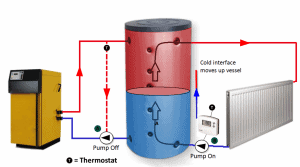 We have been working tirelessly for many years in developing stoves and fires, which are environmentally friendly and highly efficient. As a company we have a interest in the environment, and for sustainable methods of heating.
We have been working tirelessly for many years in developing stoves and fires, which are environmentally friendly and highly efficient. As a company we have a interest in the environment, and for sustainable methods of heating.
In this article we are looking at Biomass Boilers, and whether they are a real alternative to conventional central heating.
What is a Biomass Boiler?
A biomass boiler is a wood-fuelled heating system, which burns wood pellets, chips or logs to provide warmth in a single room or to power central heating and hot water boilers. A stove burns logs or pellets to heat a single room – and may be fitted with a back boiler to provide water heating as well.
What biomass boiler would be suitable for my home?
This mainly depends on the availability of fuel. Log burning boilers are great if access to free or cheap wood nearby. In winter the boiler will need to be reloaded more or less every day, so there is a large element of manual work to consider. Some pellet or chip boilers have a built in hopper, which feeds fuel directly into the boiler, which is more of a convenient option. Pellet burning boilers tend to be suited to more restricted areas.
What are the advantages of using wood as a fuel?
We have spoken at length about the significant benefits of burning wood. Although the vast scope of our material mainly focuses on wood burning stoves, the same benefits can be associated with biomass boilers, insomuch as they use a near carbon neutral, sustainable, and renewable heating source – wood! If you have your own supply of logs, a biomass boiler can be a highly cost effective set up. You should always consider the storage and delivery of fuel before specifying your boiler. All biomass fuels need to be stored in dry conditions, and all wood, like when using on a wood burning stove, should be correctly seasoned.
Where should you locate the boiler?
Most biomass boilers are larger than standard boilers, so space could be an issue. Biomass boilers should be fitted in spacious zones such as garages, and sheds or in spacious utility areas. Additional storage for the wood will also be needed.
Other installation issues
Apart from the space for the boiler and fuel, you also need to consider a flue to take the combustion gases away, as you would with a wood burning stove. Properties in a conservation area may need planning permission for this. You should also consider the lifestyle changes too – with a traditional boiler you may only need to look at it once a year, where as with this sort of boiler its quite often, a manual daily task.
Who can install a biomass boiler?
Such a boiler should be installed by an engineer who is registered with the Microgeneration Certification Scheme (MCS). This will be essential if you are planning on claiming cashback payments from the governments Renewable Heat Incentive (RHI) scheme. Before a boiler is installed ensure your installer conducts a heat loss survey to work out the required output of the boiler, for your heating demands.
What is the required maintenance?
Waste ash will usually need to be removed at least once a week, and an annual service will be strongly recommended. During the service, a clean of all the internal components and combustion chamber will take place, along with oiling of the moving components.
What kind of house is suitable for a biomass boiler?
Typically older, less well insulated properties benefit from biomass boilers. A poorly insulated 5 bed home will need a heat output of around 30 to 50kW, where a new build, which would be much more airtight would maybe only require 10-20kW.
Prices:
The typical cost for a biomass boiler is around £10,000. Automated system are generally much more expensive.








